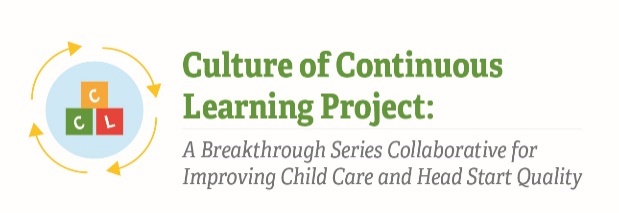Instrument 14: BSC Teachers and Support Staff Focus Group Discussion Guide
Culture of Continuous Learning Project: Case Study
Instrument 14 Focus Group Teachers Support Staff_clean
Instrument 14: BSC Teachers and Support Staff Focus Group Discussion Guide
OMB: 0970-0605

Instrument 14: BSC Teachers and Support Staff Focus Group Discussion Guide
Culture of Continuous Learning Project: A Breakthrough Series Collaborative for Improving Child Care and Head Start Quality
Respondents |
Time of Data Collection |
BSC Team Members – Teachers and Other Center Staff |
Midpoint (T2) Follow-up (T4)
|
Note: Specific questions and probes in this guide are illustrative; different questions or follow-up questions may be asked during an interview depending on the nature and flow of participants’ responses. This interview guide was pulled from CCL Phase I instruments and has been adapted to meet the needs of the current project.
Questions will be selected based on relevance at time of data collection such that the length of the focus group is no more than 90 minutes.
Thank you very much for agreeing to participate in this discussion. Your participation is very important to our research.
We are conducting a research study for the Office of Planning, Research and Evaluation at the Administration for Children and Families within the U.S. Department of Health and Human Services. The purpose of this study is to learn about the options for integrating a Breakthrough Series Collaborative (BSC) into early care and education quality improvement systems. The BSC is a specific training approach designed to support learning and improvement among practitioners at all levels of an organization, from directors to teachers who work in a classroom with children. This BSC aims to support children's social and emotional learning practices among staff who work in child care and Head Start settings. The intended use of the information collected is to study whether a BSC can enhance existing Head Start and child care training and technical assistance activities to support social and emotional learning practices.
Our conversation will last approximately an hour and a half. We will ask you about your experiences participating in the BSC and the changes you’ve noticed in yourselves and in your center through your participation in the BSC.
You will receive a $50 gift card as a thank you for your participation.
There is a chance that you may feel uncomfortable answering some of our questions. Being part of this discussion is completely voluntary. You can choose to skip any question and you can leave the focus group at any time. Additionally, there is no direct benefit to participating in this discussion. We hope the information you provide will benefit the early child care and education field.
We would like to record this conversation for note-taking purposes only. We will delete the recordings after the notes have been cleaned. We will separate your name and personal information from our notes and transcripts. Your identity and the information you share will be kept private by the research team, but because this is a group discussion, we cannot guarantee confidentiality. To respect the privacy of other participants, we ask you to please not repeat anything that is said during the discussion. This will also help everyone feel more comfortable sharing their thoughts and experiences with the group. Our report will describe the experiences and viewpoints expressed, but comments will not be attributed to specific individuals. No individuals will be quoted by name. Information shared during this conversation may be made available to other researchers for future study. However, your identity will be kept private and no comments will be able to be attributed to you.
Data files from the research component of this project may be stored in a trusted online location where they could be made available to other researchers who commit to keeping the data secure. Any personal information that could identify you will be removed before files are shared with other researchers. No research findings will include any personal information. This research is also covered by a Certificate of Confidentiality from the National Institutes of Health. This means that researchers cannot release or use information that may identify you in any way unless you say it is ok.
[For questions:] If you would like a copy of this information or have questions, please email us at ktout@childtrends.org or the IRB at irbparticipant@childtrends.org or by phone at 1-855-288-3506.
[Send comments:] Send comments regarding this burden estimate or any other aspect of this collection of information, including suggestions for reducing this burden to Kathryn Tout, ktout@childtrends.org or Child Trends, 708 N 1st Suite #333 Minneapolis, MN 55401 Attention: Kathryn Tout
[PRA statement:] A Federal agency may not conduct or sponsor, and no individual or entity is required to respond to, nor shall an individual or entity be subject to a penalty for failure to comply with a collection of information subject to the requirements of the Paperwork Reduction Act of 1995, unless that collection of information displays a currently valid OMB Control Number. The OMB number for this collection of information is 0970-0605 and the expiration date is 03/31/2026.
Are you willing to participate in this discussion and be recorded? [Yes/No]
Topic |
Subtopic |
Type of Respondent |
State and center-level factors that may have helped or hindered BSC participation |
|
Core BSC Team members – teachers and support staff |
Participant goals, needs, and expectations of the BSC |
|
Core BSC Team members – teachers and support staff |
How the BSC compares to other experiences of QI |
|
Core BSC Team members – teachers and support staff |
Cost |
|
|
| File Type | application/vnd.openxmlformats-officedocument.wordprocessingml.document |
| Author | Maria Abdul-Masih |
| File Modified | 0000-00-00 |
| File Created | 2024-07-22 |
© 2026 OMB.report | Privacy Policy